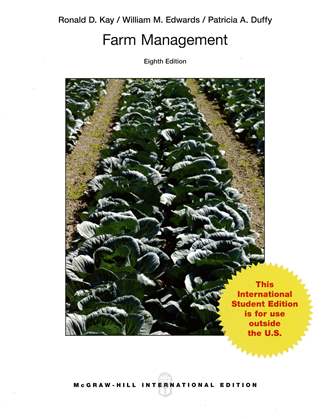書籍分類

Farm Manageme 8/e
作者:Ronald Kay, William Edwards, Patricia Duffy
原價:NT$ 920
ISBN:9789814636254
版次:8
年份:2016
出版商:McGraw-Hill
頁數/規格:466頁/平裝單色
版次:8
年份:2016
出版商:McGraw-Hill
頁數/規格:466頁/平裝單色
內容介紹 本書特色 目錄
- Description
This text is developed for the first course in Farm Management, typically taken by a junior/senior level student. Designed to introduce students to the key concepts on how to effectively manage a farm business, the eighth edition provides students with the basic information needed to measure management performance, financial progress, and the financial condition of the farm business.


